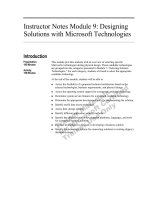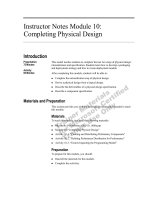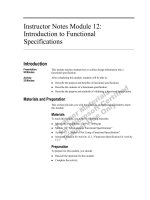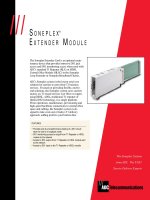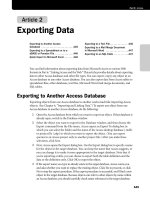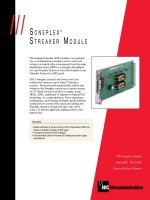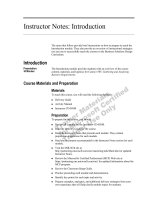Tài liệu Instructor Notes Module 9: Data Storage Considerations doc
Bạn đang xem bản rút gọn của tài liệu. Xem và tải ngay bản đầy đủ của tài liệu tại đây (89.87 KB, 4 trang )
Instructor Notes Module 9: Data
Storage Considerations
Introduction
This module discusses data storage considerations and examines several data
storage technologies.
After completing this module, students will be able to:
!
Identify different types of hardware and software for implementing a data
store.
!
Choose the appropriate hardware or software for implementing a data store.
Materials and Preparation
This section provides you with the materials and preparation needed to teach
this module.
Materials
To teach this module, you will need the following materials:
!
Microsoft
®
PowerPoint
®
file P09_1609a.ppt
!
Module 9, “Data Storage Considerations”
!
Activity 9.1, “Data Quiz”
Preparation
To prepare for this module, you should:
!
Read all materials for this module.
!
Complete the activity.
Presentation:
70 Minutes
Activity:
20 Minutes
2 Instructor Notes Module 9: Data Storage Considerations
Activities
Activity 9.1: Data Quiz
In this activity, students will divide into two groups and compete against each
other by answering questions. Use the list of questions below to test students’
knowledge of the course material. Expand on students’ answers as a way of
reviewing the material.
After completing this activity, students will be able to:
!
Identify the data characteristics and technologies appropriate for use in data-
centric solutions.
!
To prepare for the activity
1. Review the following questions and answers. Be sure you know why the
given answers are correct. You can provide additional questions and
answers based on your own experience.
a. What type of database should be used for the main Ferguson and
Bardell, Inc. data stores? Why?
Microsoft
®
SQL Server
™
version 7.0, because the number of employees
concurrently using the application is likely to exceed 30. Additionally,
many users might access the system at slower speeds than those typical
of a LAN network.
Module 9
b. Would Microsoft Visual FoxPro
®
, SQL Server, Microsoft Data Engine
(MSDE), or Microsoft Jet provide the appropriate database engine for
the traveling consultants that use the custom client application?
MSDE. Because MSDE is code-compatible with SQL Server, you could
use the same user interface for laptops, as well as desktop computers.
Module 9
c. Will mirroring or Microsoft RAID version 5 provide the best
performance for the Ferguson and Bardell, Inc. database? Why?
RAID 5. Because the Ferguson and Bardell, Inc. system is not primarily
a write-intensive application, the additional total storage capacity of
RAID 5, along with its ability to include more than two disk drives,
makes it a better choice.
Module 9
d. What issues should be considered before implementing a backup
solution for the Ferguson and Bardell, Inc. system?
Required availability, amount of data to back up, hardware from which
data is being backed up, hardware used to perform the backup, and
backup time window.
Module 9
e. What data optimization technique would guarantee that no duplicate data
is stored within the Ferguson and Bardell, Inc. database?
Normalization
Module 5
Instructor Notes Module 9: Data Storage Considerations 3
f. Which normalization form eliminates data that is not dependent upon the
primary key?
Third normal form
Module 5
g. What are the three components of a use case?
Actor, object, and relationship
Module 3
h. What are the three characteristics of data requirements?
Required, explicit, and hidden
Module 3
i. What normalization form eliminates repeating groups and guarantees
that each column corresponds to only one value?
First normal form
Module 5
j. Entities in the logical model represent what in the real world?
Nouns: people, places, and objects.
Module 4
k. Name the type of key that links a child entity to a parent entity.
Foreign key
Module 5
l. What type of index is created from more than one attribute or column?
Composite index
Module 6
m. In a physical model, what type of data relationship is generally
represented with a link table?
A many-to-many relationship
Module 6
n. RDO accesses databases through which interface?
ODBC
Module 8
o. ADO accesses databases through which interface?
OLE DB
Module 8
p. What concept determines whether two entities depend on each other for
their identities?
Existence
Module 4
4 Instructor Notes Module 9: Data Storage Considerations
Module Strategy
!
Choosing a Database Product
This section discusses several factors students should consider when
selecting a database product. Although most of these factors will be familiar
to students, you might want to spend some additional time on the
transactional systems slide, especially on the ACID components.
!
Data Storage Technologies
This section provides an overview of Microsoft data storage technologies.
Your aim is to help students differentiate the various products, and to
understand when to use which technology and why.
!
Data Storage Considerations
This section points out a number of availability issues that students will
need to consider and address when designing a data storage solution. Most
of these issues should be familiar to students. However, you might need to
spend some additional time on RAID and clustering because some students
might not have been exposed to these technologies.
